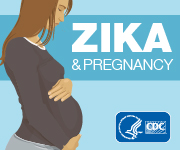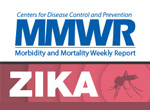COCA Clinical Reminder: February 19, 2016
Updated Interim Guidelines for Healthcare Providers Caring for Infants and Children with Possible Zika Virus Infection
February 19, 2016
Dear Clinician Outreach and Communication Activity (COCA) Subscribers,
In response to the current Zika virus outbreak, we would like to provide you with the following information. If you have any questions on these or other clinical issues, please write to us at coca@cdc.gov.
Did a colleague forward this to you?
Subscribe here for information about upcoming COCA Calls, Clinical Reminders, Training Resources, and other Public Health Updates.
February 25, 2016 COCA Call: Update on Interim Zika Virus Clinical Guidance and Recommendations
During this COCA Call, participants will learn why CDC has updated the clinical guidelines and how they can use the guidelines for Zika virus disease evaluation and testing.
For more information on this COCA Call visit:
http://emergency.cdc.gov/coca/calls/2016/callinfo_022516.asp
Date: Thursday, February 25, 2016
Time: 2:00 - 3:00 pm (Eastern Time)
Join by Phone:
888-455-0056 (U.S. Callers)
517-308-9237 (International Callers)
Passcode: 7024369
Join by Webinar:
Link one: https://www.mymeetings.com/nc/join.php?i=PW7143162&p=7024369&t=c
Overflow link two: https://www.livemeeting.com/cc/events_vbc1/join?id=PW7143162&role=attend&pw=7024369
Overflow link three: https://www.livemeeting.com/cc/events_vbc2/join?id=PW7143162&role=attend&pw=7024369
Update: Interim Guidelines for Healthcare Providers Caring for Infants and Children with Possible Zika Virus Infection
View the updated guidelines on CDC's website:
http://www.cdc.gov/mmwr/volumes/65/wr/mm6507e1er.htm?s_cid=mm6507e1er_e
CDC has updated its interim guidelines for healthcare providers who care for infants and children with possible Zika virus infection. The guidance, which has been expanded to cover children up to 18 years old, includes these updates:
- A new recommendation that infants with typical head size, normal ultrasounds, and a normal physical exam born to mothers who traveled to or lived in areas with Zika do not require any special care beyond what is routinely provided to newborns.
- A new recommendation to suspect Zika virus disease in children, in addition to infants, who have traveled to or lived in an area with Zika within the past 2 weeks and have at least two of these symptoms: fever, rash, red eyes, or joint pain. Because transmission of Zika virus from mother to infant during delivery is possible, this recommendation also applies to infants during the first 2 weeks of life whose mother traveled to or resided in an affected area within 2 weeks of delivery.
View CDC's Media Statement:
http://www.cdc.gov/media/releases/2016/s0219-zika-guidelines.html
CDC Expert Commentary Medscape Video: Advising Pregnant Women About Zika: The Latest Guidance From CDC
Watch the video or read the transcript:
http://www.medscape.com/viewarticle/858892?src=par_cdc_stm_mscpedt&faf=1
Dr. Titilope Oduyebo, an obstetrician-gynecologist with the Pregnancy and Birth Defects Team for CDC's 2016 Zika Virus Response, discusses what we know about Zika virus infection during pregnancy and reviews the current CDC recommendations for the screening, testing, and management of women with possible Zika virus exposure.
New: FDA Recommendations to Reduce the Risk for Zika Virus Blood Transmission in the United States
In areas without active Zika virus transmission, the FDA recommends that donors at risk for Zika virus infection be deferred for four weeks. Individuals considered to be at risk include: those who have had symptoms suggestive of Zika virus infection during the past four weeks, those who have had sexual contact with a person who has traveled to, or resided in, an area with active Zika virus transmission during the prior three months, and those who have traveled to areas with active transmission of Zika virus during the past four weeks.
In areas with active Zika virus transmission, the FDA recommends that Whole Blood and blood components for transfusion be obtained from areas of the U.S. without active transmission. Blood establishments may continue collecting and preparing platelets and plasma if an FDA-approved, pathogen-reduction device is used. The guidance also recommends blood establishments update donor education materials with information about Zika virus signs and symptoms and ask potentially affected donors to refrain from giving blood.
Read more on FDA's website:
http://www.fda.gov/NewsEvents/Newsroom/PressAnnouncements/ucm486359.htm
The CDC and HHS logos are the exclusive property of the Department of Health and Human Services and may not be used for any purpose without prior express written permission. Use of trade names and commercial sources is for identification only and does not imply endorsement by the US Department of Health and Human Services.
Links to non-Federal organizations are provided solely as a service to our users. Links do not constitute an endorsement of any organization by CDC or the Federal Government, and none should be inferred. The CDC is not responsible for the content of the individual organizations.
- Page last reviewed: February 19, 2016
- Page last updated: March 4, 2016
- Content source:
- Maintained By:





 ShareCompartir
ShareCompartir